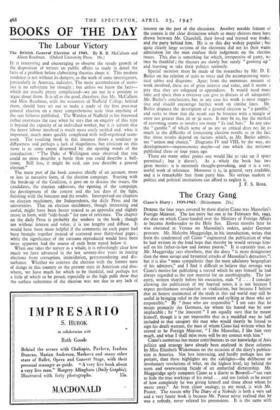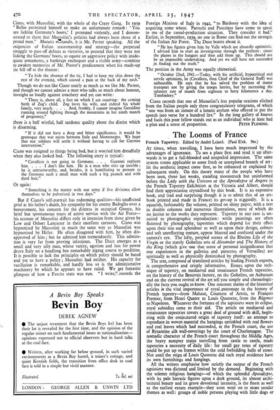The Crazy Gang
Ciano's Diary : 1939-1943. (Heinemann. 21s.)
DURING the four years covered by these diaries Ciano was Mussolini's Foreign Minister. The last entry but one is for February 8th, 1943, the date on which Ciano handed over the Ministry of Foreign Affairs to become Ambassador to the Holy See. Eleven months later he was executed at Verona on Mussolini's orders, under German pressure. Mr. Malcolm Muggeridge, in his introduction, writes that from the condemned cell Ciano " engineered the publication of what he had written in the fond hope that thereby he would revenge him- self on his father-in-law and former patron." It is certainly true, as Mr. Muggeridge says elsewhere, that the diary "is more denigratory than the most savage and hysterical attacks of Mussolini's detractors "; but it is also "more sympathetic than the most adulatory biographies of his admirers," and I find it difficult to believe that revenge was Ciano's motive for publishing a record which he says himself he had always regarded. as the raw material for an autobiography. The last entry, written shortly before his execution, ends " if . . . I consider allowing the publication of my hurried notes, it is not because I expect posthumous revaluation or vindication, but because I believe that an honest testimonial of the truth in this sad world may still be useful in bringing relief to the innocent and striking at those who are responsible." By " those who are responsible " I am sure that he meant primarily the Germans, for whom his hatred was by now implacable ; by " the innocent " I am equally sure that he meant himself, though it is not impossible that in a muddled way he half included in that category the man who would shortly be forced to sign his death warrant, the man of whom Ciano had written when he ceased to be Foreign Minister, " I like Mussolini,1 like him very much, and what I shall miss most will be my contact with him."
Ciano's numerous but minor contributions to our knowledge of Axis politics and strategy have already been analysed in these columns by Miss Elizabeth Wiskemann on the occasion of the diary's publica- tion in America. Not less interesting, and hardly perhaps less im- portant, than these highlights are the sidelights—the. deliberate or involuntary revelations of what, on the highest level, lay behind the stern and overweening facade of an embattled dictatorship. Mr. Muggeridge aptly compares Ciano as a diarist to Boswell—" too vain to hide the true workings of his mind .. . and too foolish to be aware of how completely he was giving himself and those about whom he wrote away." An tven closer analogy, to my mind, is with Mr. Pooter. The reason why The Diary of a Nobody is both a very sad and a very funny book is because Mr. Pooter never realised that he was a nobody, never relaxed his pretensions. It is the same with
Ciano, with Mussolini, with the whole of the Crazy Gang. In 1939 " Balbo permitted himself to make an unfortunate remark : You are licking Germany's boots,' I protested violently, and I demon- strated to them that Mussolini's policies had always been those of a proud man." Mutatis In..tandis, it is Mr. Pooter speaking. All the exigencies of Italian statesmanship and strategy—the perpetual struggle to pass off defeats as victories, to pretend that they were not licking the Germans' boots, to equate an aggressive policy with inade- quate armaments, a bankrupt exchequer and a risible army—combine to awaken memories of Mr. Pooter's predicament when his made-up tie fell off at the theatre : " To hide the absence of the tie, I had to keep my chin down the rest of the evening, which caused a pain at the back of my neck."
Though we do not like Ciano nearly as much as we like Mr. Pooter, and though we cannot admire a man who talks so much about honour, inveighs so loudly against treachery and yet can write : " There is, above all, a fact on which I am counting: the coming birth of Zoi's child. Zog loves his wife, and indeed his whole family, very much. . . . And, frankly, I cannot imagine Geraldine running around fighting through the mountains in her ninth month of pregnancy,"
there is a half wistful, half sardonic quality about the diarist which is disarming.
" If it did not have a deep and bitter significance, it would be grotesque that war exists between Italy and Montenegro. We hope that our soldiers will settle it without having to call for German intervention."
Ciano was resigned to things being bad, but it worried him dreadfully when they also looked bad. The following entry is typical :
" Cavallero is not going to Germany. . . . Guzzoni replaces him. . . . I don't like him. He is a man who stirs up trouble ; he is untrustworthy, and, besides, it is humiliating to present to the Germans such a small man with such a big paunch and with dyed hair."
Or again: " Something is the matter with our army if five divisions allow themselves to be pulverised in two days."
But if Ciano's self-portrait has redeeming qualities—his unaffected grief at his father's death, his sympathy for his enemy Badoglio over a bereavement, his concern for the dittress in occupied Greece, his brief but spontaneous tours of active service with the Air Force— his account of Mussolini differs only in intention from those given by Low and Osbert Lancaster in their excellent cartoons. Ciano was hypnotised by Mussolini in much the same way as Mussolini was hypnotised by Hitler. He often disagreed with him, he often dis- approved of hint ; but he admired him tremendously. This admira- tion is very far from proving infectious. The Duce emerges as a small and very silly man, whose vanity, egotism and lust for power drove Italy on a headlong but remarkably zigzag course to perdition. It is possible to lack the principles on which policy should be based and yet to have a policy ; Mussolini had neither. His capacity for vacillation is remarkable, and hardly less so is the administrative machinery by which he appears to have ruled. We get fantastic glimpses of how a Fascist state was run. " I write," records the Foreign Minister of It4ly in 1942, " to Bardossy with the idea of acquiring some wheat. Pareschi and Pascolato have come to speak to me of the cereal-production situation. They consider it bad." Earlier, in September, 1939, no one in Rome can find out the strength of the Italian Air Force. The Duce boasts about it.
" He has figures given him by Valle which are absurdly optimistic. I advised him to start an investigation through the prefects: count the planes in the hangars and then add them up. This should not be an impossible undertaking. And yet we still have not succeeded in finding out the truth."
The position in the Army was equally chimerical.
" October 22nd, 1941.—Today, with his artificial, hypocritical and servile optimism, he (Cavallero, then Chief of the General Staff) was unbearable. He says that he has solved the problem of motor transport not by giving the troops lorries, but by increating the infantry rate of march from eighteen to forty kilometres a day. Tomfoolery."
Ciano records that one of Mussolini's less popular orations elicited from the Italian people only three congratulatory telegrams, of which " one was from an inmate of a lunatic asylum who offered to put the speech into verse for a hundred lire." In the long gallery of knaves and fools this poor fellow stands out as an individual who at least had
a plan and a sense of proportion. PETER FLEMING.



































 Previous page
Previous page